
Saskatchewan’s challenge of federal carbon tax in hands of Appeal court
REGINA — Five Saskatchewan judges have reserved their decision on the constitutionality of a federally imposed carbon tax after two days of hearings in Regina.
Lawyers representing provincial governments, Indigenous groups and environmentalists from across Canada presented their cases before the Saskatchewan Court of Appeal.
Saskatchewan has asked the court to rule on whether a federal carbon tax is constitutional. The province contends such a levy is not because it wouldn’t be evenly applied across all jurisdictions.
On Thursday, Ottawa and its supporters had their turn to argue. They said the federal government has the power to impose a carbon tax because Section 91 of the Constitution states it can pass laws “for peace, order and good government of Canada.”


